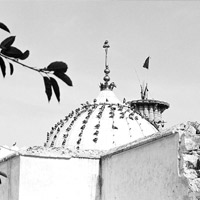Khwaja Qutub-ud-din Bakhtiyar Kaki is a famous Sufi of Chishtiyah order. He was the chief disciple and Caliph of Khwaja Moeen-ud-Din Chishti. Khwaja Bakhtiar Kaki was born in the city of Aush in Turkistan. Since his father died when he was only18 months old, his mother arranged for him very good education and training. When Khwaja Muin-ud-din Chishti went to Isfahan, forty days before his demise, Khwaja Bakhtiar took oath of allegiance at his hands and received certificate of Khilafat and Khirqah (Sufi cloak) from him. Thus he was the first spiritual successor of Khwaja Gharib Nawaz Muin-ud-din Chishti. Thereater, his spiritual master asked him to leave for India and settle there. Following his order, he went to Delhi and stayed there. It was the period of Sultan Shams-ud-din Iltumish. It is narrated that in the early stages of his life, he would take a nap but in the last part of his life he kept awake all the night. He ahad committed the Holy Quran and used to recite it twice a day. Whenever anything came to Khanqah, he would quickly distribute it among the poor and the needy. If there was nothing to give, he would request his attendants and devotees to serve them with plain water as a humble token of his hospitality.
Sheikh Nur Bukhsh has written in his book Silsila tuz’zah: “Bakhtiar Kaki was a great devotee, mystic and friend of Allah. He was habituated to eat little, sleep little and speak little. He was a towering personality in the world of sufism.” Sultan Shams-ud-din Iltumish who held him in great esteem offered him the post of Sheik-ul-Islam but he declined the offer. Later, on the same post Sheikh Najam-ud-din Saghra who was also a saintly person of Chistiyah order was appointed. But soon Ulama a prolonged debate started between Khwaja Sahib and the Sheikh accompanied by on Sama (Qwali). On the side of Khwaja Bakhtiar Kaki was his close associate Qazi Hamid-ud-din Nagori who had been Qazi at Nagore and an author of several prose works. With an ample experience and knowledge of law, he coped with their criticism quite successfully and proved that there was not any sort of indiscipline concerning Sama. Thus the legal arguments put forward by Nagori and Iltumish’s own inclination towards Sama favored Khwaja Sahib in particular and the sufis in general.
He met his death in an unusual manner. In an assembly of Sama, he happened to hear a Persian verse (Kushtgaan-e-khanjar-e-tasleem ra/her zaman az ghaib jaan-e-deegar ast). It means: ‘Those who are killed with the dagger of submission, are blessed with a new life at each and every moment by the Unseen.’ Khwaja Sahib was so much inspired and enthralled that from that day on he kept on reciting the same verse in a state of bliss and rapture for three days and surrendered his life on the 4th day on 27 December 1230 (14th Rajab-ul-awwal 633 A.H.). On account of this extra-ordinary departure to the World Hereafter he is remembered as Shaheed-i-Mahabbat (Martyr of Allah’s love). His tomb lies near Qutub Minar that was built in the memory of Khwaja Sahib by Sultan Iltumish. Farid-ud-din Gang Shakar, Qazi Hamid-ud-din Nagori and Sheikh Badr-ud-din Ghaznavi were among his notable disciples. He nominated Farid-ud-din Gang Shakar as his successor.
This article was last updated on Monday, Jan 03, 2005






